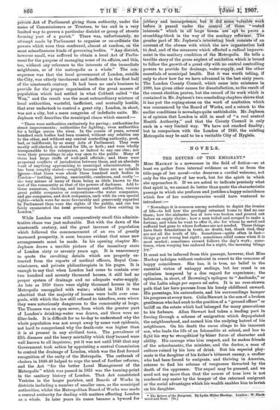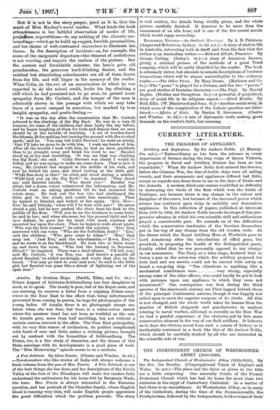NOVELS.
TEE RETURN OF THE EMIGRANT.*
Miss MACKAY is a newcomer in the field of fiction—so at least we gather from internal evidence as well as from the title-page of her novel—who deserves a cordial welcome, not only for the quality of her work, but for the spirit in 'which she approaches it. If we are asked to 'indicate precisely what that spirit is, we cannot do better than quote the characteristic passage in which she prefaces and justifies& happy coincidence which few of her contemporaries would have ventured to introduce.:—
" Nowadays it is common among novelists to depict the ironies of life—to tell how the prodigal returned home to find no one there ; how the alabaster box of love was broken and poured out before an empty shrine ; how a man toiled and scraped to make a fortune, and when he went to offer it, she for whom he saved and. suffered had gone to where fortunes are not needed. These things have their foundations in truth, no doubt, but, thank God, they are not all the truth of life. Sometimes—quite often in fact— things go not wrong but right; sometimes relief comes when it is most needed; sometimes reward follows the day's work ; some- times, when weeping has endured for a night, the morning biings joy."
It must not be inferred from this passage, however, that Miss Mackay indulges without restraint in resort to the romance of happy coincidence. She has, it is true, no belief in the essential virtue of unhappy endings, but her tweed is an optimism tempered by a due regard for experience; the optimism, in short, of Brownings epilogue to " Asolando," or of the Latin adage per repent ad astra. It is no rose-strewn path that her hero pursues from his lonely childhood onward. His parentage, his antecedents, and his surroundings hamper his progress at every turn. Colin Stewart is the son of a broken gentleman who had sunk to the position of a "ground officer" or bailiff on the estate which had belonged for many generations to his forbears. Allan Stewart had taken a leading part in forcing through a scheme of emigration which depopulated the neighbourhood, and earned him the undying hatred of his neighbours. On his death the curse clings to his innocent son, who leads the life of an Ishmaelite at school, and has to fight-his way -to. recogrlitiori:byilieer force. of character and ability. His courage wins him respect, and he makes friends of the schoolmaster, the minister, and the doctor, a man of culture ruined by his love of drink. But his especial play- mate is the daughter of his father's bitterest enemy, a crofter who had been forced to emigrate, and thriving in America, returns to find his scheme of vengeance thwarted by the death of the oppressor. The sequel may be guessed, and we need not say more than that the course of true love is not rendered an easier by the temper' 'of the returned emigrant or the social advantages which his wealth enables him to lavish on his daughter.
• The Return ciao Emignott. By Lydia Miller Mackay. London W. Black. wood and Soon. [6s. J But it is not in the story proper, good as it is, that the merit ,of Miss Mackars novel 'resides. What lends the book attractiveness is her faithful observation of modes of life, prejudices, supeistitions—to say nothing of the climatic sur- roundings—which go to build up rugged, forcible personalities, and her choice of well-contrasted characters to illustrate her, theme. In the description of incident—as, for example, the scene of the emigrants' departure—the element of melodrama is not wanting, and impairs the realism of the picture. But the austere and formidable minister, the hero's grim old grandmother, the generous bard-drinking doctor, and the crabbed but stimulating schoolmaster are all of them drawn from the life, and will linger in the memory of the reader. When Colin, on the eve of an examination in which he was expected to do the school credit, broke his leg climbing a cliff which he had promised not to go near, he gained scant sympathy from Mr. Corbett, and the temper of the man is admirably shown in the passage with which we may take leave of a novel unequal in execution, but marked by true insight, sympathy, and poetic feeling "It was on the day after the examination that Mr. Corbett referred to the climbing, a, the Big Rock. He was in a very ill humour, for some of the children had done badly the day before, and he began laughing at them for fools and dunces that no man should be at the trouble of teaching. A set of wooden-faced blockheads, fit for nothing but turning the ground with the crooked spade,' said he. 'You may tell Colin Stewart,' he went on sourly, that I'll take no more to do with him. I wash my hands of him. After all the trouble I took with him, he had no more gratitude than to go straight away and break his word to me.' Barabel stood Up in'her seat trembling. 'It was me that was climbing the Big Rock,' she said. Colin Stewart was afraid I would be killed; and he was trying to make me come down. That is how it was,' Mr. Corbett had stopped in the middle of his walk, and now he folded his arms mad stood looking at the little girl What fine story is this ? ' lie cried, and stood staring a minute. 'Whke took you up the Big Rock!' he inquired. They dared me,' said, Barabel faintly. Wlio dared you ?' Barabel was silent, but a dozen voices volunteered the information, and Mr. Corbett went on asking questions till he had extracted the whole story. He took out the boy who had challenged the little girl to the climb, and caned him mercilessly. Then he tinned to Barabel and looked at her again. Eve- -Eve— Eve,' he said bitterly, when will I be done with you?' He never struck a girl, but he now pushed the chair from his desk to the middle of the floor. • Will you do me the kindness to come here,' he said to her ; and when she came, her lips pressed tight and her eyes defiant, he gave her his hand with mock courtesy and mounted her upon the chair. Then he began to walk about again.
Who was the first woman ?' he asked the scholars. 'Eve,' they answered with one voice. Who ate the forbidden fruit?' Eve, said the children. Who gave some to Adam ? " Eve,' they sang out. 'Just Eve,' said the schoolmaster,—' E-v-e, Eve,'— and he wrote it on the blackboard. He took two or three turns up and down the room. Who lost the bursary to Boronach
School ? ' be inquired. There was a dead silence. tell you,' said Mr. Corbett, it was Eve, too. And there's a parable all about Barabel,' he added mockingly, and wrote that also on the board. Yon may go back to your seat now,' he said to the little girl, but Barabel was gone like a streak of lightning out of the open door!'







































 Previous page
Previous page